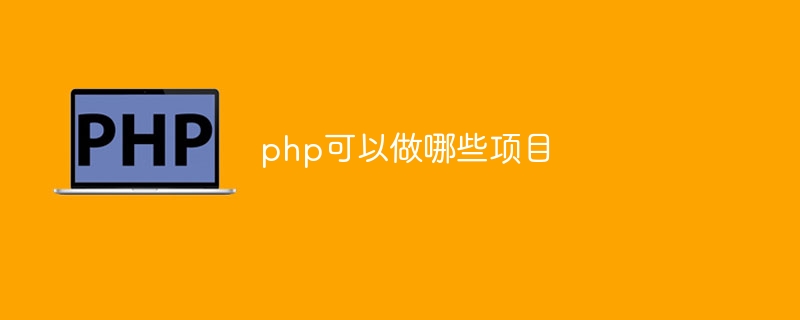Home >Backend Development >PHP Problem >What projects can be done with php
What projects can be done with php
- 小老鼠Original
- 2023-07-19 16:21:352386browse
Projects that
php can do include: 1. Website development and management, such as personal blogs and e-commerce platforms; 2. Content management systems, such as WordPress and Drupal; 3. Social platforms and forums, such as Facebook, Discuz! and more.

The operating environment of this tutorial: Windows 10 system, PHP8.1.3 version, Dell G3 computer.
In today's era of rapid development of the Internet, PHP, as an open source server-side scripting language, is widely used in the field of Web development. Its easy-to-learn, flexible, efficient and scalable features make it the language of choice for many project development. The following will introduce the projects that PHP can implement and analyze them through actual cases.
1. Website development and management
One of the most common application areas of PHP is website development and management. Whether it is a personal blog, corporate website or e-commerce platform, PHP can provide complete functions and interactive experience. Specific examples are as follows:
Case 1: Personal Blog
A personal blog website named "ABC Blog", the back-end uses PHP and MySQL for development and management, and the front-end uses HTML, CSS and JavaScript for design. User registration, login, article publishing, comments, classification, tags and other functions are implemented through PHP. The rich plug-ins and templates also provide bloggers with great freedom.
Case 2: E-commerce platform
An e-commerce platform called "XYZ Store" uses PHP to develop the back-end system and implements product management, shopping cart, order management, and payment interfaces and other functions. Through the features of PHP, developers can quickly build efficient and reliable websites, and provide personalized shopping experience and powerful back-end management functions.
2. Content Management System (CMS)
Content management system refers to applications used to create, edit and publish various forms of digital content. As a dynamic programming language, PHP is very suitable for building a powerful CMS system. The following are two cases:
Case 1: WordPress
As one of the most popular CMS, WordPress uses PHP to build powerful functional plug-ins, theme design and back-end management functions. Users can easily build personal blogs, news websites, corporate websites, etc. in this way.
Case 2: Drupal
Drupal is another well-known and powerful CMS system, also developed based on PHP. It is highly customizable and scalable and suitable for enterprise applications, social networking sites, and government agency websites of all sizes.
3. Social platforms and forums
PHP can help build social platforms and forum websites that include user registration, login, information release, comments, private messages and other functions. The following are two cases:
Case 1: Facebook
As one of the world's largest social media platforms, Facebook uses PHP to build a powerful back-end system for user management, freshness Core functions such as event updates and friend relationships.
Case 2: Discuz!
Discuz! is an excellent forum program also developed using PHP. It provides comprehensive forum functions, including post management, user permissions, points system, etc. Through the flexibility of PHP, developers can customize it according to actual needs.
Summary:
As a widely used server-side scripting language, PHP is suitable for various web development projects. In this article, we introduce PHP application cases in the fields of website development and management, CMS systems, and social platforms and forums. These cases demonstrate the power and flexibility of PHP, while also proving its scalability and reliability. With the rapid development of the Internet, PHP remains a powerful force in the field of web development.
The above is the detailed content of What projects can be done with php. For more information, please follow other related articles on the PHP Chinese website!

